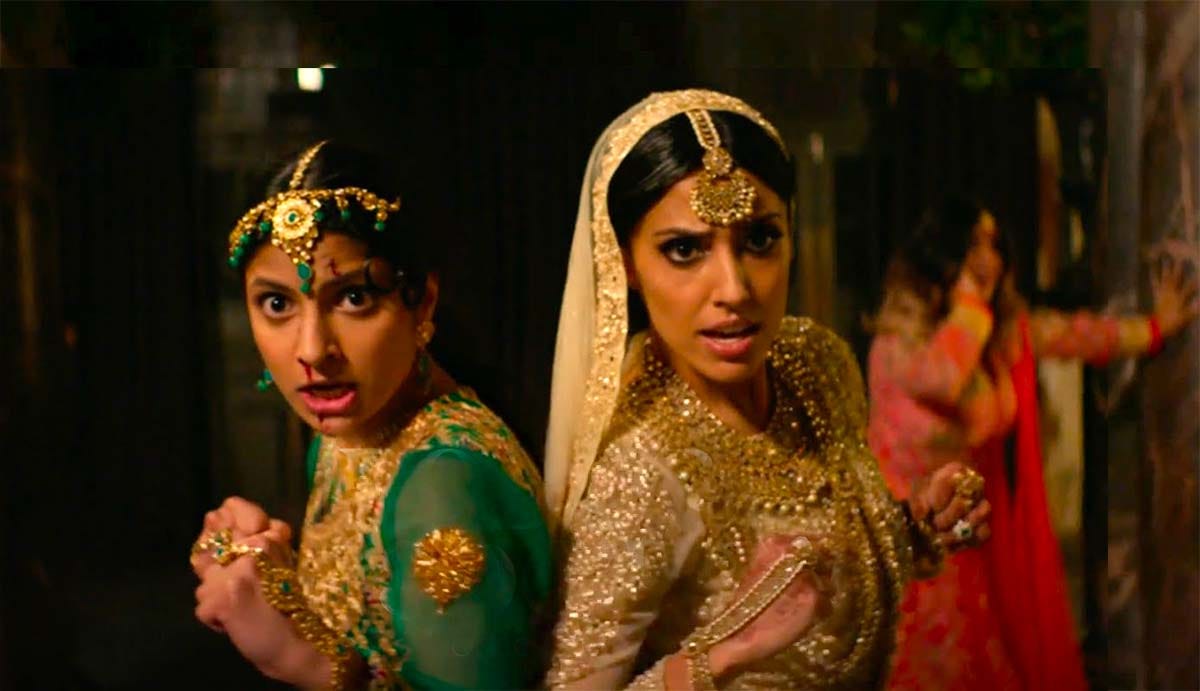Polite Society Is An Anti-Romcom Romcom
With flying kicks
There are spoilers here, if you care about that sort of thing.
Nida Manzoor's raucous Polite Society has been praised for its mishmash of genres; martial arts pic, Bollywood extravaganza, heartwarming family comedy. In many ways, though, it's a movie defined by what it isn't. The Pride and Prejudice reference gives it away; this is an anti-romcom. What else do you call a movie structured around a (failed) wedding?
The wedding in question belongs to Lena Khan (Ritu Arya). She's a depressed art school drop-out, at sea after she decides she has no real artistic talent. She tries to put her life together again by letting herself fall a little in love with Salim (Akshay Khanna), a fit young surgeon who her parents have set her up with in a quasi-arranged marriage.
The only barrier the plan is the movie's real protagonist, Ria (Priya Kansara), Lena's high-school aged younger sister. Lena wants to become a stuntwoman, and is more than a little over-invested in her sister's artistic career and independence. She is determined to discover dirt on Salim. Eventually she stumbles on what she is sure is a terrifying conspiracy set up by Salim and his aggressively attentive mother Raheela (Nimra Bucha) to use Lena's room for nefarious purposes.
Ria righteously rejects the romcom plot offered to Lena; she claims that Lena is doing a "Jane Austen," and adds snarkily, "throwing your life away to marry some rich Mr. Darcy wanker sound pretty 1800s to me." The barrage of martial arts set pieces—with Ria fighting a rival at school, then Lena, then a bunch of Raheela's henchwomen trying to give her a bikini wax for the wedding, and finally the big boss Raheela herself—function as a frenetic statement of emancipation from the getting-to-know-you jokes and escalating intimacy of the romcom and its patriarchal rescuers. Ria even turns the big Bollywood set piece dance into a martial arts menace; when she gestures to Salim to come hither, she's not promising him a sisterly kiss, but a beatdown.
All the karate chops to the face of the romcom are also something of a distraction though, from the fact that the film in a lot of ways is a romcom after all. The romance just isn't between protective spouses, but between sisters.
As in a romcom, you see how good Ria and Lena are together, as they make martial arts videos for Ria's website, dance in the living room, and encourage each other's dreams. Then they are split apart by misunderstanding and self-doubt. Finally, they happily reconcile at the end, with a big wedding and, crucially, career success—Lena agrees to think about returning to art, while Ria finally sets up a brunch with her stunt woman idol.
As romance author Jennifer Crusie points out, in contemporary romance novels, women don't just find love, they also find personal, and generally fulfillment. In a romance, Crusie says, "A woman is rewarded with unconditional love [only] if she remains true to herself." The real romcom plot, then, is Lena/Ria, not Ria/Salim, because Salim doesn't want Ria to be true to herself.
By the end, we learn there's a third (anti)romcom plot—the one between Salim and his mom, who is the true love of his life. He only cares about Lena as a womb, which he hopes will raise his mother's clone.
Ironically, Raheela wants a clone baby because she believes she herself was forced to marry too young and was never allowed to achieve her full potential. She says at one point that she and Ria are alike, and it's true in the sense that they both feel constrained by the traditional gendered expectations of their Pakistani families (as well as in the sense that they are both martial arts experts!)
The movie doesn't exactly have a lot of sympathy for Raheela and her Oedipal plots. But it does suggest that the anti-romcom also reflects her self-actualization; she wants to blow up the "happy" heterosexual couple in order to achieve her own self-actualization (via clone) just as Ria wants to achieve her own self-actualization (via martial arts stunts.)
The film rejects romcoms, and embraces them, and rejects them, and back and forth. It refuses the stultifying traditional expectations of family—but also insists that family is a resource and a source of love and affirmation. Ria's resistance to the romcom is built on East Asian martial arts movies, but also on South Asian Bollywood. Her closest friends are Black and white, but her closest relationship is with her sister. The romcom is about a lot of things, but one thing it's often about is expanding one's circle of family. Polite Society treats sisterhood as a launching pad for the most vicious flying kick, an exogamous triumph powered by endogamous love. It's a little confusing and contradictory, but so is love, even when you get to happily ever after.



